人教版高中英语【必修三】[知识点整理及重点题型梳理] 情态动词(Ⅰ)
人教版高中英语必修三知识详解
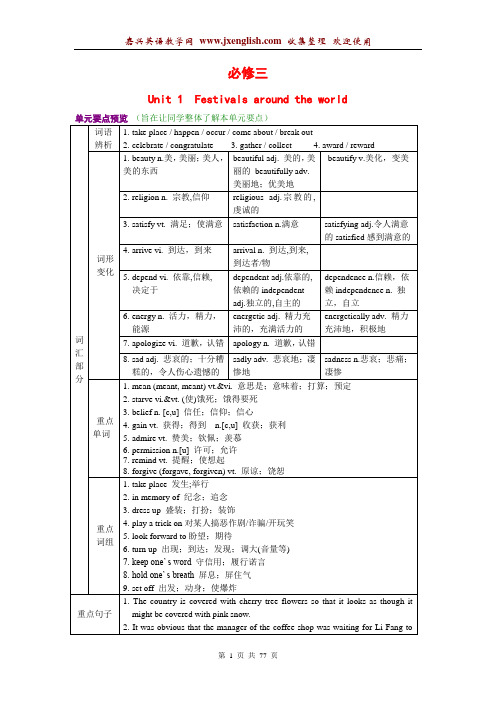
必修三Unit 1 Festivals around the world语言要点(模块)Ⅰ.词语辨析(旨在提供完形填空所需材料)Ⅱ.词性变化(旨在提供语法填空所需材料)Ⅲ.重点词汇(旨在提供词汇综合运用所需材料)1. mean (meant, meant) vt.&vi. 意思是;意味着;打算;预定[典例]1). The sign means that the road is blocked. 这个标志表示此路不通。
2). What do you mean to do with it? 你打算把它怎样处理?3). I mean you to work as our spokesman. 我想请你当我们的代言人。
[重点用法](sth.) mean doing sth. 意味着… (sb) mean to do sth. 打算做…had meant to do sth. 本来打算做某事be meant for 打算作……用;打算给…(sth.) be meant to do sth. 被预定/指定/认为做某事What do/did you mean by...? ―你……是什么意思?‖[练习] 按要求填空或翻译。
1). Can you tell me what this sentence______ (mean)?2). Your friendship ______ (mean) a great deal ______ (介词) me.3). In some parts of London, missing a bus means ______ (wait) for another hour.4). What did he mean ______ (介词) saying that remark?5). I ______ ______ ______ ______(本来打算来)yesterday, but I had an unexpected visitor.6). 这些房间是打算用作少年活动中心的。
人教课标版高中英语必修3Unit1_单元语法详解

Unit1 单元语法详解情态动词(I)情态动词的基本用法情态动词本身有一定的词义,表示说话人的情绪、态度或语气,但不能单独作谓语,只能和其他动词原形构成谓语。
情态动词用在行为动词前,表示说话人对这一动作或状态的看法或主观设想。
情态动词虽然数量不多,但用途广泛。
1. may/might(1)表示许可或征询对方意见,意为“可以”,主要用于肯定句和疑问句中。
might比may的语气更委婉。
You may park here. 你可以在这里停车。
May I speak to you? 我可以跟你说话吗?(2)may可以放在句首,表示祝愿。
固定句型为“May+主语+do”。
May you succeed! 祝你成功!May you both be happy! 祝你们二位幸福!(3)表可能性,意为“也许”,常用于肯定句(might可能性最小)。
He may refuse to speak to you, because he’s in a bad mood.他可能会拒绝和你说话,因为他的情绪不好。
例1单句填空No matter how late it ( be),she will wait for her son to have dinner together.解析:考查情态动词。
句意:不管多么晚,她都要等儿子一起吃晚饭。
根据语境可知,此处may在让步状语从句中,表示一种可能性。
答案:may be2. can/could(1)表示具备某种能力,常译作“能”、“会”。
could主要指过去能做。
Can you play the piano? 你会弹钢琴吗?He could speak English when he was a child.当他是个孩子的时候他就会说英语。
(2)表示提出请求或征求许可。
could用于疑问句中表示委婉语气,但不用于答语中。
Can/Could I smoke here? 我可以在这里吸烟吗?(3 ) can可用于肯定句中,表示常有的行为和情形,意为“有时会,时而可能”。
人教版高一英语必修三 unit1 grammar --情态动词
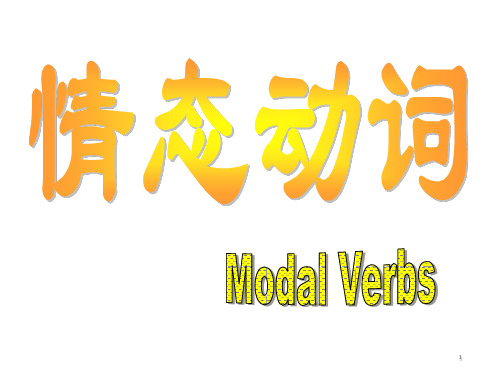
4. 情态动词表推测时应注意的几个问题:
1) 完全否定推测用can’t be(“不可能”): 肯定 推测用must be(“肯定,一定”)
He can’t be Peter. Peter has gone abroad. 2) 疑问句中的推测用can…be:
3. He is black and blue all over. His father _m__u_st__h_a_v_e_b_e_a_t_e_n__ (beat) him.
4. The train started an hour ago. Now it _m__u_s_t_b_e_t_r_a_v_e_ll_in__g_ (travel) on the great plain.
16
7.Lily came to school last Sunday. She __n_e_e_d_n’_t_h_a_v_e _g_o_n_e___ to school. (本来没必要上学) 8. You __c_o_u_l_d h_a_v_e__do_n_e____ your homework better last time. (本来可以做得更好) 9. _M__a_y__ I open the window, Mr Wang? (可以) 10. I __s_h_a_ll beat you if you tell me a lie. (我会打你的)
18
16. You n__ee_d_n__’t _ come to school this afternoon.(不必)
1t7h.Yisoauft_e_rn_o_doonn_.’_(t_n_不e_e必d__t)o___ come to school
Unit 1 情态动词 语法知识梳理 人教版高中英语必修第三册

Unit 1 语法Can/ could/ be able tocan、could与be able to都可以用于表示能力,区别在于:1. can仅表示某人现在有能力做某事,相当于am/is/are able to,但后者更正式。
例如:The police are doing all they can to find her.警方正在尽一切所能找她。
2. could表示某人在过去有能力做某事,相当于was/were able to。
例如:By the time she was eight, she could read Greek and Latin.她八岁时就会读希腊文和拉丁文了。
He was able to walk with a stick.他能拄着拐杖行走。
3. 表达将来有能力做某事用will be able to do。
例如:After only a few lessons, you will be able to understand basic Spanish.只需几节课之后,你就能听懂最基本的西班牙语了。
4. can、could仅能表达现在或过去的能力,但be able to 还含有成功地做成了某事,相当于manage to do sth./succeed in doing sth.。
例如:The fire spread through the hotel very quickly but everyone was able to get out.这场大火迅速蔓延到了整个宾馆,但是每个人都逃了出来。
I'm sorry that I wasn't able to phone you yesterday.对不起,昨天我没能给你打电话。
can、could除了表示能力还可用于以下用法:1. 表示请求和许可表示请求时,could更加委婉,不表示过去。
注意:could 通常不表示许可,因此回答仍用can。
人教版高中英语必修三语法总结

人教版高中英语必修三语法总结高中英语必修三语法主要考点有情态动词、名词性从句、同位语从句等,下面是具体的高中英语必修三语法,仅供参考。
1英语必修三有哪些语法要学考点一情态动词(unit1,unit2)一、情态动词的特点:1.没有人称和数的变化。
2.有些情态动词有过去式的变化:e.g.will→would,can→could,may→might,dare→dared二、情态动词的否定式:情态动词+not+动词原形cannot:can’t,mustnot:mustn’t,neednot:needn’t三、情态动词的用法及相互区别,是考试的内容之一1.can,beabletobeableto表示经过努力后,能够做到;beableto有多种形式的变化。
can1).表示体力或脑力方面的能力;2).表示允许、可能性。
could是can的过去式,表示过去有能力及过去存在的可能性;用于疑问句表示委婉地提出问题。
1)Thefirespreadthroughthehotelveryquicklybuteveryone____getout.(NMET97)A.hadtoB.wouldC.couldD.wasableto2)-Willyoustayforlunch?-Sorry,__.Mybrotheriscomingtoseeme.(NMET99)A.Imustn’tB.Ican’tC.Ineedn’tD.Iwon’t2.may表示询问或说明一件事可不可做;表示某事有可能发生。
might是may的过去式;用在疑问中比may委婉、客气。
1)-MayItakethisbookoutofthereading-room?-No,youmustn’t.(Yes,youmay.)2)-MightImakeasuggestion?-Yes,youmay.3.must1).表示必须要做的事:必须2)表示很有把握的推断:一定,准是。
have(has)to:have(has)gotto必须,不得不。
新人教版高中英语必修三知识点总结(详细)
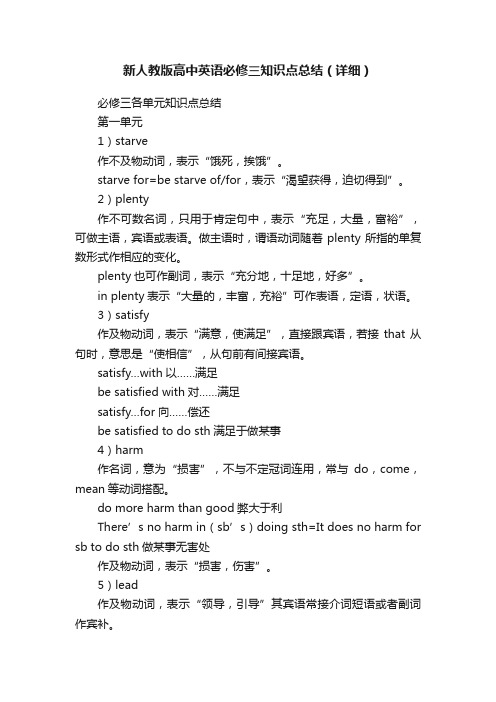
新人教版高中英语必修三知识点总结(详细)必修三各单元知识点总结第一单元1)starve作不及物动词,表示“饿死,挨饿”。
starve for=be starve of/for,表示“渴望获得,迫切得到”。
2)plenty作不可数名词,只用于肯定句中,表示“充足,大量,富裕”,可做主语,宾语或表语。
做主语时,谓语动词随着plenty所指的单复数形式作相应的变化。
plenty也可作副词,表示“充分地,十足地,好多”。
in plenty表示“大量的,丰富,充裕”可作表语,定语,状语。
3)satisfy作及物动词,表示“满意,使满足”,直接跟宾语,若接that从句时,意思是“使相信”,从句前有间接宾语。
satisfy…with以……满足be satisfied with对……满足satisfy…for向……偿还be satisfied to do sth满足于做某事4)harm作名词,意为“损害”,不与不定冠词连用,常与do,come,mean等动词搭配。
do more harm than good弊大于利There’s no harm in(sb’s)doing sth=It does no harm for sb to do sth做某事无害处作及物动词,表示“损害,伤害”。
5)lead作及物动词,表示“领导,引导”其宾语常接介词短语或者副词作宾补。
表示“影响,致使”时,后接介词to,也可以接不定式。
lead sb into使某人陷入某种不良的状态。
lead sb away使盲从,常用于被动语态。
lead nowhere毫无结果,,对……不起作用。
lead up to sth作为……准备,导致。
lead sb by the nose牵着某人的鼻子,完全操纵某人lead a dog’s life过困难的生活lead sb believe that使某人相信(假的事情或不确切的事情)lead the way带路,带头lead作为名词,give sb a lead给某人做出榜样,提示某人6)origin是名词,表示“起源,起因,出身”。
人教版高中英语必修3 五个单元语法知识点汇总
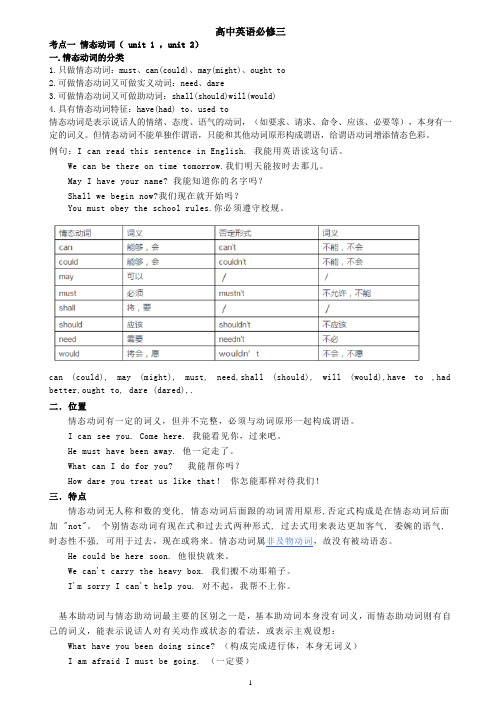
高中英语必修三考点一情态动词( unit 1 ,unit 2)一.情态动词的分类1.只做情态动词:must、can(could)、may(might)、ought to2.可做情态动词又可做实义动词:need、dare3.可做情态动词又可做助动词:shall(should)will(would)4.具有情态动词特征:have(had) to、used to情态动词是表示说话人的情绪、态度、语气的动词,(如要求、请求、命令、应该、必要等),本身有一定的词义。
但情态动词不能单独作谓语,只能和其他动词原形构成谓语,给谓语动词增添情态色彩。
例句:I can read this sentence in English. 我能用英语读这句话。
We can be there on time tomorrow.我们明天能按时去那儿。
May I have your name? 我能知道你的名字吗?Shall we begin now?我们现在就开始吗?You must obey the school rules.你必须遵守校规。
can (could), may (might), must, need,shall (should), will (would),have to ,had better,ought to, dare (dared),.二.位置情态动词有一定的词义,但并不完整,必须与动词原形一起构成谓语。
I can see you. Come here. 我能看见你,过来吧。
He must have been away. 他一定走了。
What can I do for you? 我能帮你吗?How dare you treat us like that!你怎能那样对待我们!三.特点情态动词无人称和数的变化, 情态动词后面跟的动词需用原形,否定式构成是在情态动词后面加 "not"。
个别情态动词有现在式和过去式两种形式, 过去式用来表达更加客气, 委婉的语气, 时态性不强, 可用于过去,现在或将来。
人教版版高中英语必修三重点语法汇总

选修3重点语法汇总Unit1重点语法:情态动词情态动词是一种本身有一定的词义,表示说话人的情绪、态度或语气的动词,但不能单独作谓语,只能和其他动词原形构成谓语。
本单元学习情态动词的用法。
1.may 与might的用法2. can与could的用法3. will与would的用法4.shall与should的用法5. must, may (might) 和can表示“推测”的用法6.should与ought to用法7.need与dare用法8. used to与would用法Unit1一、情态动词表推测:1. 大多数情态动词(除表‘能力、许可、意志’外),都可以表示推测,其程度有差异。
按可能性程度的高低排列为:must ﹥will ﹥would ﹥ought to ﹥should完全肯定完全可能很可能﹥can ﹥could﹥may ﹥might可能有可能2. 区分情态动词的否定含义:may not或许不、可能不might not可能不can’t 不可能mustn't不许、禁止shouldn’t不应该needn’t 不必3. 情态动词表推测具体运用:情态动词可以对现在、进行、过去推测。
4. 表示反劝的特殊的表推测形式5. 注意:二、情态动词表推测的反意疑问句1.情态动词表推测的反意疑问句,简单来说,就是以情态动词后的时态为淮,如句子里有明确的时间状语,则以其为准。
2.以must 为例:Eg.1. You must be hungry now, aren’t you?2. He must be watching TV , isn’t he ?3 Tom must have lived her for a long time, hasn’t he ?4. She must have arrived yesterday, didn’t she?注:如选择题中(以She must have arrived yesterday, didn’t she?为例)既有didn’t she又有hasn’t she则以didn’t she?为最佳答案。
高中英语人教版必修三语法归纳
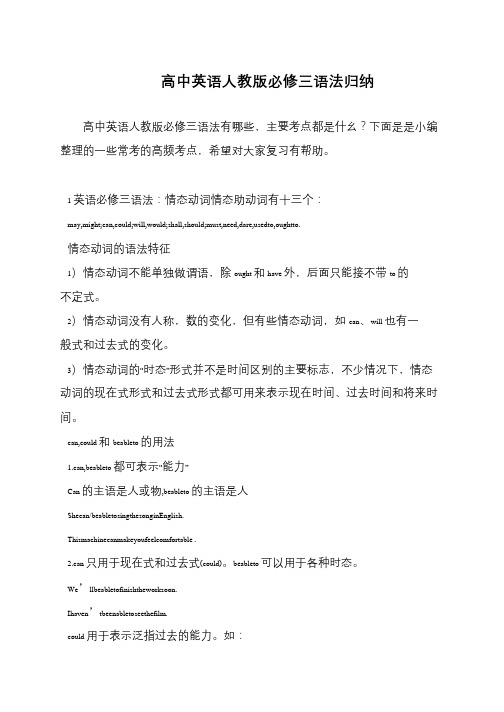
高中英语人教版必修三语法归纳
高中英语人教版必修三语法有哪些,主要考点都是什幺?下面是是小编整理的一些常考的高频考点,希望对大家复习有帮助。
1 英语必修三语法:情态动词情态助动词有十三个:
may,might;can,could;will,would;shall,should;must,need,dare,usedto,oughtto.
情态动词的语法特征
1)情态动词不能单独做谓语,除ought 和have 外,后面只能接不带to 的
不定式。
2)情态动词没有人称,数的变化,但有些情态动词,如can、will 也有一
般式和过去式的变化。
3)情态动词的“时态”形式并不是时间区别的主要标志,不少情况下,情态动词的现在式形式和过去式形式都可用来表示现在时间、过去时间和将来时间。
can,could 和beableto 的用法
1.can,beableto 都可表示“能力”
Can 的主语是人或物,beableto 的主语是人
Shecan/beabletosingthesonginEnglish. Thismachinecanmakeyoufeelcomfortable .
2.can 只用于现在式和过去式(could)。
beableto 可以用于各种时态。
We’llbeabletofinishtheworksoon.
Ihaven’tbeenabletoseethefilm.
could 用于表示泛指过去的能力。
如:。
人教版高中英语(必修3)重点词汇、短语、句型、语法全汇总

人教版高中英语(必修3)重点词汇、短语、句型、语法全汇总Unit1 Festivals around the world重点词汇1.take place 发生2.religious 宗教的3.in memory of 纪念4.belief 信任,信心,信仰5.dress up 盛装,打扮6.trick 诡计,窍门7.play a trick on 搞恶作剧,诈骗8.gain 获得9.gather 搜集,集合10.award 奖品,授予11.admire 赞美,钦佩12.look forward to 期望,盼望13.day and night 日夜14.as though 好像15.have fun with 玩的开心16.permission 许可,允许17.turn up 出现,到场18.keep one's word 守信用19.hold one's breath 屏息20.apologize道歉21.obvious 显然的22.set off 出发,动身,使爆炸重点短语1.mean doing sth. 意味着mean to do sth. 打算或企图做某事mean sb. to do sth. 打算让某人做某事be meant for 打算作……用; 为…而有2.take place 发生;举行3.of all kinds 各种各样的4.starve to death 饿死be starved of 缺乏starve for sth, starve to do 渴望5.plenty of 大量; 充足6.be satisfied with对......感到满意to one's satisfaction令某人感到满意7.do harm to sb.=do sb. harm 伤害某人8.in the shape of 呈…的形状,以…的形式9.in memory of/ to the memory of sb.纪念某人10.dress up 穿上最好的衣服;打扮,化装11.award sth.(to sb.)和award sb.sth.(for sth.) 颁奖reward sb. for sth. 因…奖赏某人reward sb. with sth. 用某物酬劳某人12.admire sb. for sth在某方面钦佩某人13.look forward to期望,期待,盼望14.have fun with(与某人)玩得开心;过得快乐( have a good time;enjoy oneself.)15. turn up 出现;调大/高turn down 拒绝;调小/低turn off 关掉turn on 打开turn out 结果是......turn to sb. for help 向某人求助16.keep one's word 守信用break one's word, 失信17.It be obvious that-clause显而易见;一目了然18.set off 出发; 使(地雷、炸弹)爆炸set in 开始set up 建立,创立set out to do = set about doing sth. 着手做set down 写下,记下19.remind sb. of sth. 提醒,使想起重点句型1.Please make sure when and where the accident took place.请查清楚事故是何时何地发生的。
人教高中英语必修三Unit1课本知识点复习

⼈教⾼中英语必修三Unit1课本知识点复习必修三Unit 1课本知识点复习⼀. 词汇变形1. mean v./adj. 打算;意味着;吝啬的-- meaning n. 含义-- means(单复数同形)n.⽅式2. celebrate v. 庆祝-- celebration n. 庆祝3. starve v.挨饿-- starvation n. 挨饿,饥饿4. origin n. 起源;起因-- original adj. 原来的,起初的-- originally adv. 原来;起初5. honour v./n. 尊敬,尊重-- honourable adj. 可敬的,品格⾼尚的6. satisfy v. 满⾜-- satisfied adj. 感到满意的-- satisfying adj. 令⼈满意的-- satisfaction n. 满意7. belief n. 信⼼;信念-- believe v. 相信8. arrive v. 到达-- arrival n. 达到9. independence n. 独⽴,⾃主-- independent adj. 独⽴⾃主的-- dependent adj. 依赖的10. admire v.赞美;钦佩;羡慕-- admirable adj.令⼈羡慕的-- admiration n.钦佩;赞赏11. energy n. 能量-- energetic adj. 充满活⼒的12. fool n./v 愚⼈;愚弄-- foolish adj.愚蠢的-- foolishly adv. 愚蠢地-- foolishness n. 愚蠢13. permit v./n. 允许,许可;许可证-- permission n. 允许14. please v. 使愉快-- pleasing adj. 令⼈⾼兴的-- pleased adj. 感到⾼兴的--pleasant adj. 令⼈愉快的-- pleasure n. 愉快15. apologize v. 道歉-- apology n. 道歉16. remind v.提醒-- reminder n. 提⽰信;通知单17. forgive v. 原谅-- forgivable adj. 可原谅的-- forgiveness n. 原谅,宽恕18. religion n. 宗教-- religious adj. 宗教的⼆. 短语积累1.(1)mean vt. 有....的⽬的,打算。
人教版高中英语必修3 Unit1 情态动词第四讲:need、dare 基本用法

(天津高考)
It’s quite warm here; we ________ turn the heldn’t
B. mustn’t
走进dare
你敢吗?-dare 基本用法特点
1. dare用作情态动词时,意思是“敢”,其后接动词原形,通常只
1. I wonder how he A. dare to say C. not dare say
实战演练
that to the teacher. B. dare saying D. dared say
课程小结
need dare
用法小结
情态动词 (+动词原形)
实意动词
多用于肯定句; (sb.) need to do
你需要特别记need
need作为实意动词 有人称、数和时态的变化(在变为否定句和疑问句时 需借助于助动词)
(1)当主语是人时,后可接名词和动词不定式, 即: need sth./ need to do sth. 如: He needs some help. 他需要一些帮助。
特殊用法
need作名词用,当“需要,必需”解,不可数。可构成下列短语和 句型:
实战演练
1._T_h_e_r_e_i_s_n_o__n_e_e_d_t_o_ worry at all. 根本没有必要担忧。 2.I’ll come when you __a_r_e_i_n_n_e_e_d__o_f__ help.
典型应用
通过前面的学习,相信大家对这堂课的知识 点有了初步的了解。下面我们通过几个例题 加深对知识的理解及运用:
2. dare用作实意动词时意为“敢于”,可以有各种词形变化,可用于 各类句型(肯定句、否定句、疑问句及各类从句等),其后多接带to的不定 式,有时to也可省去(尤其是在否定句或疑问句),可用于非谓语形式,完 成时态等:
人教版高中英语必修3新人教版必修三Unit 1 Festivals around the world 语法情态动词

情态动词情态动词表示说话人的语气和情态。
如需要、可能、愿意、怀疑等。
情态动词有一定的词义,但不完整,必须和主要动词的原型一起构成谓语。
常用的情态动词有:can, could, may, might, must, have to, ought to, need, dare, shall, will, should, would, be able to,及半情态动词be to do, had better等。
情态动词的基本用法:(一)can“能够”1.表示体力或脑力方面的能力,或根据客观规律能做某事的能力。
如:I can go there now.(1)can表“能够”时,既可指现在也可指将来。
(2)can与be able to的区别:①表“能力”时二者同义No one can / is able to do it.②be able to常侧重经过努力有能力做到,有多种时态。
can侧重自身的能力,只有一般现在时和一般过去时。
③was / were able to do表示通过努力克服困难或在一定的条件下成功地做了某事,侧重结果,相当于managed to do或succeeded in doing...。
could仅表自身的能力或本领,但未必成功做到。
With the help of the firemen, they were able to leave the burning house.He was able to swim across the river.In the end, we were able to rescue the workers trapped in the fire.2.表示“许可,允许”。
在疑问句中表示请求,许可;否定句中表示“不许”。
此时常与may 通用:May/Can I do it?This sort of thing can't go on! 这类事情不能再继续了!can not有时可以表示“禁止”相当于mustn't:You can't(mustn't,are not allowed to)play football in the street.你不可以在大街上踢球。
人教版英语高三必修3 Unit1 情态动词的用法

知识点 must/have to/need/dare的用法
考点分析
1. must/have to 表示“必须”
(1)在否定回答时不能用 mustn't(禁止,不准),而用 needn't 或者 don't have
to(不必)。
(2)must 指说话人的主观看法,而 have to 强调客观需要。must 只有一般现
(2)用于虚拟语气表示“万一”或“竟然”。should have done sth.表示“本 应该做某事,但事实上却没有做”。
You should often help your mother with the housework. 你应该常帮你母 亲做家务。
He shall have the book when I finish reading. 当我读完这本书他就可以看了。
对点训练 用适当的情态动词填空 1. Each competitor ____s_ha_ll/_sh_o_ul_d _ch_oo_s_e _______________(choose) a number in the competition. 2. I planted a flower last year, but it ______w_o_ul_d _no_t _gr_ow______________(not grow) without enough sun.
I think the task can be completed in advance. 我想这项任务能提前完成。
人教版高一英语英语必修3Unit1语法情态动词 (共35张PPT)
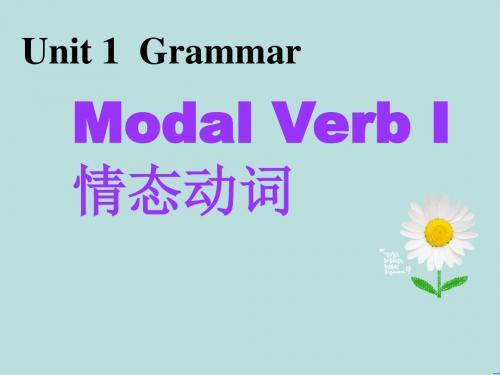
can’t be home yet.
Exercise
3. 表示祝愿; 但语气较正式: eg. May you succeed! May you have a good journey!
might 的用法
may 的过去时,表示可能性时,语气 显得更加不确定。
My friend might arrive this afternoon.
9/15/2019
4 The weather turned out to be fine yesterday. I _____ the trouble to carry my umbrella with me. (2006 江西) A should have taken B could have taken C needn’t have taken D mustn’t have taken
Unit 1 Grammar
Modal Verb I 情态动词
什么是情态动词? (Modal Verbs)
情态动词表示说话人的某种感情或 语气,对某一动作或状态的某种态度。
表示“需要、可以、必须、应当”等。
Underline the modal verbs
① Most ancient festivals would
should 用法
5. “居然”,“竟然”,表说话人意料之外。
To my surprise, he should be a thief. Why should everyone want to marry Tony?
人教版必修三第一单元语法:情态动词基本用法

Book 3 Unit 1 Festivals around the world高考常考情态动词的基本用法总结:can1) 能力Mary can speak three foreign languages.玛丽能说三门外语。
注意:can只能表示现在的能力,could表示过去的能力,be able to do可以表示现在、将来和过去的能力,am/is /are able to do ,will be able to do,was/ were able to docould表示过去的能力,不表示是否做was/ were able to do 表示过去有能力做并且成功做了Tom could swim at the age of nine.could(过去的能力,不表是否做)汤姆在九岁就能游泳。
The fire spread through the hotel very quickly but everyone was able to get out .( was able to过去有能力做,并且成功做了)was able to 在本句相当于manage to do /succeeded to do尽管这场大火迅速蔓延到了整个宾馆,但是每个人都逃了出去。
2)许可/允许--Can /Could(表委婉/客气) I use your pen?我可以用一下你的钢笔吗?--Yes, you can.(回答只能用can)--No, I’m afraid not.3)可能(在否定句和疑问句中表示具体发生的可能性,在肯定句中表示理论上的可能性)--Can it be true ?那事可能是真的吗?--It can’t be true.它不可能是真(具体发生的可能性Harvest and Thanksgiving festival can be very happy events.(理论上的可能性)收获节和感恩节可能是非常喜庆的节日。
高中英语人教版必修三语法归纳

高中英语人教版必修三语法归纳高中英语人教版必修三语法有哪些,主要考点都是什幺?下面是是小编整理的一些常考的高频考点,希望对大家复习有帮助。
1 英语必修三语法:情态动词情态助动词有十三个:may,might;can,could;will,would;shall,should;must,need,dare,usedto,oughtto.情态动词的语法特征1)情态动词不能单独做谓语,除ought 和have 外,后面只能接不带to 的不定式。
2)情态动词没有人称,数的变化,但有些情态动词,如can、will 也有一般式和过去式的变化。
3)情态动词的“时态”形式并不是时间区别的主要标志,不少情况下,情态动词的现在式形式和过去式形式都可用来表示现在时间、过去时间和将来时间。
can,could 和beableto 的用法1.can,beableto 都可表示“能力”Can 的主语是人或物,beableto 的主语是人Shecan/beabletosingthesonginEnglish. Thismachinecanmakeyoufeelcomfortable .2.can 只用于现在式和过去式(could)。
beableto 可以用于各种时态。
We’llbeabletofinishtheworksoon.Ihaven’tbeenabletoseethefilm.could 用于表示泛指过去的能力。
如:IcouldreadwhenIwasfour.Althoughthesoldierwasbadlywounded,hewasabletotellwhathadhappened. Sheranfastbutshecouldn’t/wasn’table tocatchthebus.3.表示特定的某一过去能力或表示成功地做了某事时,只能用was/wereableto,不能用could。
HewasabletofleeEuropebeforethewarbrokeout. Hewasabletoswimhalfwaybeforehegottired.4.could 不表示时态,表示委婉的请求,(注意在回答中不可用could)。
人教版高一英语英语必修3Unit1语法情态动词共47张

---No, you needn ' t. 不,你不必。
三.用作名词
need作为名词,含义为“缺乏 ,需要”;其复数表示“基本需要” 。
1.It's no need doing sth 做 …没用 1). There's no need for you to try
情态动词: 1.表意愿或意志
I will never do it again. If you will marry me, whatever I have is yours, and
mines பைடு நூலகம்s yours.
2020 年4月28日星期二
12
2.提出 请求或建议 ,在疑问句中用于第二人称。
eg: If you want help , let me know, will you?
B. 表示说话者的推测 ﹑事物的可能性:(否、疑)
eg. Can the news be true? C. 在口语中 , can 可以表示请求或允许:
eg. Can I sit here?
2020 年4月 28日星期二
4
2. could 的主要用法是: A. could 是can 的过去式 , 表示与过去 有关的能力 和推测 :
will/would need, dare
2020 年 4月 28 日星期二
2
? 情态动词的特点:
1.情态动词自身都有一定的意义, 但不能表示正在发生或已经发生的 事情,只表示期待或估计某事发生。
2.情态动词除 ought 和have 外,后 面必须接不带 to的不定式。 3.情态动词没有人称和数的变化 ,
- 1、下载文档前请自行甄别文档内容的完整性,平台不提供额外的编辑、内容补充、找答案等附加服务。
- 2、"仅部分预览"的文档,不可在线预览部分如存在完整性等问题,可反馈申请退款(可完整预览的文档不适用该条件!)。
- 3、如文档侵犯您的权益,请联系客服反馈,我们会尽快为您处理(人工客服工作时间:9:00-18:30)。
人教版高中英语必修三知识点梳理重点题型(常考知识点)巩固练习情态动词(Ⅰ)概念引入The classroom can seat thirty students. 这教室能坐三十位学生。
You must obey the school rules.你必须遵守校规。
It is cold in the room. They must have turned off the heating.屋里很冷,他们肯定把暖气关了。
It must / may / might / could have rained last night .The ground is wet.地湿了,昨晚肯定/可能/也许下雨了。
注意这些句子中的斜体词部分,都是情态动词,这些情态动词看着很熟悉,但是也有点陌生,如后两个句子中与have done连用。
究竟哪些词属于情态动词呢?它们各自都有什么用法呢?为什么情态动词有时需要与have done连用呢?从此单元开始,我们就小结一下情态动词的用法。
语法讲解【356516 情态动词】概念及shall/should概念在动词(一般动词)之前形成动词的否定,疑问,时态,语态,语气或表示特殊意义的动词叫做助动词,其中具有感情色彩一些助动词叫做情态动词。
分类: be动词, have, do;---助动词shall, should, will would, can, could, may, might, must, ought, need, dare, used和had better. ---情态动词例如:----What was the something you saw? 你看见的是什么?----I…, I couldn’t say. 我不能说。
----You could n’t say or you wouldn’t say? 你不能说还是你不愿意说?情态动词是一种本身有一定的词义,但要与动词原形及其被动语态一起使用,给谓语动词增添情态色彩,表示说话人对有关行为或事物的态度和看法,认为其可能、应该或必要等。
情态动词后面加动词原形。
shall1. shall在纯表示将来的陈述句中只用于第一人称。
2. 在问句中征求对方的意见和指示的时候常用于第一、三人称。
Shall I post your letter for you?Shall we carry your baggage?Henry is waiting outside. Shall he come in?3. 用于第二、三人称,表示说话人的许诺、命令、警告、威胁或允诺等。
Tell Jerry that he shall get a gift if he is nice.You shall be punished for what you’ve done.should1. 构成过去将来时作为shall的过去时。
He asked me whether I should be free tonight.2. 表示主语的义务或责任。
You shouldn’t eat between meals, for it will make you fat.3. 表示很大的可能性,常译为“按道理说应该”。
There should be a double “m” in the word swimming.4. 用于否定句、疑问句表示“竟然”,含意外、惊异、愤怒、失望等语气。
Why should you be so late today?I don’t understand wh y you should think that I did it.5. 在if 从句中表示“万一”。
Ask Tom to ring me up if you should see him.6. 重要句型:should have done 表示过去没有做到本来应该做的事情shouldn’t have done 做了本来不应该做的事情You should have given him more help.You shouldn’t have left home without saying a wo rd.can/could(could是can的过去时)(1)表示能力。
如:He can speak English better than you.can和be able to都可表示能力,两者在意思上没有什么区别。
但是can只能有现在式和过去式could,而be able to则有更多的形式,可位于情态动词之后表达过去成功地做了某事。
如:He will be able to do the work better.He was able to finish the work on time.(2)表示客观的可能性,也可以表示一时的情况,意为:有时候会。
Accidents can happen to any drunken driver.According to the radio, it could rain this afternoon.It can be very hot here in summer.(3)表示“许可”时can可以和may换用,如:如果要表示语气婉转,可用could代替can,这时could不再是can的过去式,注意回答时不能用could,而用can。
You can (may) go home now.---- Could you come again tomorrow?---- Yes, I can./ No, I can’t.(4) 在疑问句和否定句中表示推测、怀疑、惊奇、不相信的态度。
如:Can this green bike be Liu Dong’s?How can you believe such a liar like him?(5) could have done有虚拟的含义,即“本来能够做,但事实上却没有做”。
例如:You could have told me earlier.I could have helped her.I could have passed the exam if I had worked harder.may/might (might是may的过去式)(1)表示允许或许可,否定用mustn’t, 表禁止。
如:----May we swim in this lake?----No, you mustn’t. It’s too dangerous.肯定可以用比较婉转的说法进行回答。
如:---- May I use this dictionary?---- Yes, please. /---- Certainly. / Yes, you can.(2)在表示请求时,用might比may 语气更婉转些, 如:May I have a look at your new computer?注意:May I…?在文体上较正式,较客气,日常口语中常用Can I…?(3)may或might都可以表示可能性,表示“或许”、“可能”之意,might表示语气更加不肯定,如:They may (might) be in the library now .He is absent. He may/ might be ill.(2015 陕西高考) The person who sets out late might be careless in driving.(4) may have done表示“某一事件在过去发生的可能性”。
如:—Why hasn’t she come?—She may have missed the train.另外,might have done还有虚拟的含义,表示“与事实相反”。
如:You were stupid to try climbing up there. You might have killed yourself.(5) May用于祈使句,表示祝愿。
如:May you have a happy life.May you succeed.比较:Wish you a happy new year. Wish you success.must和have tomust(1)must表示“必须”、“应该”之意,语气比should, ought to强烈,其否定式must not,缩写形式为mustn’t,表示“不准”、或“禁止”之意,如:We must study hard and make progress every day.You mustn’t touch the fire.(2) 对以must提出的疑问句,如作否定回答时,要用needn’t或用don’t (doesn’t) have to (不必)来回答,而不用mustn’t,因为mustn’t表示的是“禁止”或“不许可”之意,如:---- Must we finish the work tomorrow?---- No, you needn’t (don’t have to), but you must finish it in three days.(3) must可以表示推测,表示“一定”或“必定”之意,只用于肯定句中。
如:---- Whose new bike can it be?---- It must be Liu Dong’s. I know his father has just bought him a new one.You must be ill. I can see it from your face.(4) must have done 用于对过去或已经完成的事情的推测。
must be doing 用于对现在正在进行的事情的推测。
It must be raining outside. 外面一定在下雨。
He must have gone over the article, hasn’t he?你已经浏览过这篇文章了,是吧?have to(1)have to和must的意义相近,只是must侧重表示说话人的主观看法,而have to 则表示客观需要,如:I must ask you not to do that again. 我必须要求你再也不要那么做了。
(2015 广东高考) Son, if you want to catch a fish, you have to think like a fish.孩子,如果你想要抓住鱼,你必须像鱼一样思考。
You have to hand in your compositions before next Monday.(2)have to 有人称、数和时态的变化,否定式要用助动词,如don’t have to:They had to speed up, for the weather turned terrible.He has to stay at home because of illnesswill和wouldwill的基本用法(1) 可以表示“意志”或“决心”,如:I have told him again and again to stop smoking, but he will not listen.—Can someone help me? —I will.(2) 请求或询问对方的意愿,如:Will you please tell me how to get to the Capital Gymnasium?Will you open the window?(3)表示一种习惯性或某种倾向的动作,有“总是”或“惯于”之意,will 指现在,would 指过去。
